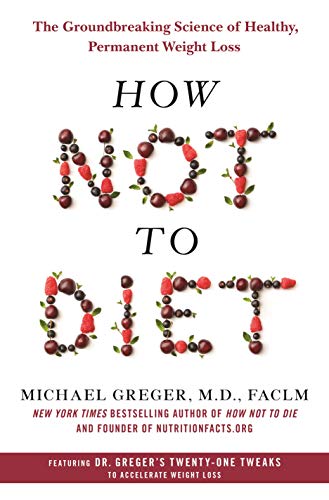
How Not to Diet
Michael Greger
About the Author

Michael Greger
Questions & Answers
The key factors contributing to the obesity epidemic, as argued by the author, include the increase in processed and high-calorie foods, the rise of food marketing, and the decrease in physical activity. The author claims that the food industry, through its aggressive marketing and manipulation of ingredients, is complicit in the proliferation of obesity. They highlight the industry's use of sugar, fat, and salt to make foods more appealing and addictive, and its efforts to downplay the role of diet in obesity. Additionally, the author criticizes the diet industry for perpetuating pseudoscience and misleading consumers with fad diets, rather than addressing the root causes of obesity.
The author proposes to create an optimal weight-loss diet by focusing on a whole food, plant-based diet, emphasizing foods that are anti-inflammatory, clean, high in fiber-rich foods, and more. The seventeen key ingredients identified for this diet are:
- Anti-inflammatory
- Clean
- High in fiber-rich foods
- High in water-rich foods
- Low glycemic load
- Low in added fat
- Low in added sugar
- Low in addictive foods
- Low in calorie density
- Low in meat
- Low in refined grains
- Low in salt
- Low insulin index
- Microbiome-friendly
- Rich in fruits and vegetables
- Rich in legumes
- Satiating
Popular and fad diets often rely on testimonials and pseudoscience, which can be misleading. Potential pitfalls include:
- Lack of scientific evidence: Many diets lack scientific backing, leading to ineffective or unsafe weight loss.
- Overreliance on testimonials: These can be biased and not representative of the general population.
- Pseudoscience: Misrepresenting scientific concepts to sell a product or idea.
- Lack of sustainability: Diets that are too restrictive or unhealthy are hard to maintain long-term.
The author differentiates evidence-based recommendations from pseudoscience by:
- Citing scientific studies: Providing references to original research and data.
- Emphasizing the best available evidence: Prioritizing the most compelling and actionable findings.
- Highlighting uncertainties: Being transparent about when conclusions are less certain.
- Encouraging critical thinking: Empowering readers to evaluate information and make informed decisions.
The author integrates various scientific fields into the weight-loss strategy by emphasizing the role of chronobiology and microbiome research. Chronobiology is used to suggest that the timing of meals can impact weight loss, with eating more calories earlier in the day potentially leading to better results. The microbiome is highlighted as crucial for weight control, with the author advocating for a diet rich in fiber and whole foods to promote a healthy gut flora. Practical implications include focusing on a plant-based diet, increasing fiber intake, and considering meal timing to optimize weight loss. This approach encourages individuals to consider both diet and lifestyle factors beyond just calorie counting.
The author, Dr. Michael Greger, suggests various weight-loss boosters, including:
- Self-weighing: Regular weigh-ins can reinforce healthy habits and provide feedback.
- Apple cider vinegar: Consuming vinegar can help reduce body fat.
- Saffron: This spice can suppress appetite and aid in weight loss.
- Bright light exposure: Morning light can boost metabolism and weight loss.
- Melatonin: This hormone can help regulate sleep and potentially aid in weight loss.
- Chewing gum: Avoid artificial sweeteners and opt for sugar-free gum with natural sweeteners.
- Exercise: Incorporate walking, especially brisk walking, into daily routines.
- Spices: Use spices like ginger and black pepper for potential fat-burning benefits.
- Implementation intentions: Set specific plans to overcome barriers to healthy eating.
- Hydration: Drink plenty of water to stay hydrated and potentially boost metabolism.
- Intermittent fasting: Alternate between periods of eating and fasting.
- Sleep: Aim for 7-8 hours of quality sleep per night.
To incorporate these strategies, individuals can:
- Start with small changes, like adding a few minutes of walking to their daily routine.
- Use the author's Daily Dozen app to track their progress and set reminders.
- Gradually increase the frequency and intensity of their chosen boosters.
- Seek professional advice before making significant lifestyle changes.